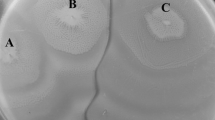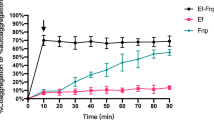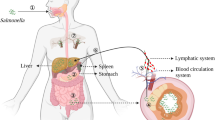Abstract
Free-living amoebae of the genus Acanthamoeba are causative agents of Acanthamoeba keratitis and amoebic encephalitis in humans, both of which are serious infections. The ability to produce proteases is one of the factors involved in the pathogenesis of Acanthamoeba infections. The aim of this study was to evaluate the secreted proteases of six Acanthamoeba strains from distinct genotypes (T1, T2, T4 and T11) maintained in prolonged axenic culture and following three successive passages in Madin-Darby Canine Kidney (MDCK) cells. Conditioned medium was obtained from cultures before and after interaction with the MDCK monolayers, resolved in SDS-PAGE containing gelatine, then subjected to quantitative azocasein assays. Zymography profiles varied between the strains, with the predominant proteases found to be serine-type proteases from 49 to 128 kDa. A T1 genotype strain isolated from dust showed quantitatively higher protease secretion compared to the other strains. No changes were detected in the zymography profiles of MDCK-interacted cultures compared to long-term axenic cultures. Two strains presented lower proteolytic activity post-MDCK interaction, while the remaining strains presented similar values before and after MDCK passages. In conclusion, this study confirms the predominance of serine-type protease secretion by Acanthamoeba, with distinct profiles presented by the different strains and genotypes studied. Also, interaction of trophozoites with MDCK cells did not alter the zymography pattern.


Similar content being viewed by others
References
Alfieri SC, Correia CE, Motegi SA, Pral EM (2000) Proteinase activities in total extracts and in medium conditioned by Acanthamoeba polyphaga trophozoites. J Parasitol 86:220–227. https://doi.org/10.1645/0022-3395(2000)086[0220:PAITEA]2.0.CO;2
Alizadeh H, Neelam S, Hurt M, Niederkorn JY (2005) Role of contact lens wear, bacterial flora, and mannose-induced pathogenic protease in the pathogenesis of amoebic keratitis. Infect Immun 73:1061–1068. https://doi.org/10.1128/IAI.73.2.1061-1068.2005
Alsam S, Sissons J, Jayasekera S, Khan NA (2005) Extracellular proteases of Acanthamoeba castellanii (encephalitis isolate belonging to T1 genotype) contribute to increased permeability in an in vitro model of the human blood-brain barrier. J Infect 51:150–156. https://doi.org/10.1016/j.jinf.2004.09.001
Alves D d SMM, Moraes AS, Alves LM et al (2016) Experimental infection of T4 Acanthamoeba genotype determines the pathogenic potential. Parasitol Res. 115:3435–3440. https://doi.org/10.1007/s00436-016-5105-3
Booton GC, Visvesvara GS, Byers TJ, Kelly DJ, Fuerst PA (2005) Identification and distribution of Acanthamoeba species genotypes associated with nonkeratitis infections. J Clin Microbiol 43:1689–1693. https://doi.org/10.1128/JCM.43.4.1689-1693.2005
Bridle AR, Davenport DL, Crosbie PBB, Polinski M, Nowak BF (2015) Neoparamoeba perurans loses virulence during clonal culture. Int J Parasitol 45:575–578. https://doi.org/10.1016/J.IJPARA.2015.04.005
Clarke DW, Niederkorn JY (2006) The pathophysiology of Acanthamoeba keratitis. Trends Parasitol 22:175–180. https://doi.org/10.1016/j.pt.2006.02.004
Corsaro D, Walochnik J, Köhsler M, Rott MB (2015) Acanthamoeba misidentification and multiple labels: redefining genotypes T16, T19, and T20 and proposal for Acanthamoeba micheli sp. nov. (genotype T19). Parasitol Res 114:2481–2490. https://doi.org/10.1007/s00436-015-4445-8
Da Rocha-Azevedo B, Costa E, Silva-Filho F (2007) Biological characterization of a clinical and an environmental isolate of Acanthamoeba polyphaga: analysis of relevant parameters to decode pathogenicity. Arch Microbiol 188:441–449. https://doi.org/10.1007/s00203-007-0264-3
De Souza Carvalho FR, Carrijo-Carvalho LC, Chudzinski-Tavassi AM et al (2011) Serine-like proteolytic enzymes correlated with differential pathogenicity in patients with acute Acanthamoeba keratitis. Clin Microbiol Infect 17:603–609. https://doi.org/10.1111/j.1469-0691.2010.03252.x
Duarte JL, Furst C, Klisiowicz DR, Klassen G, Costa AO (2013) Morphological, genotypic, and physiological characterization of Acanthamoeba isolates from keratitis patients and the domestic environment in Vitoria, Espírito Santo, Brazil. Exp Parasitol 135:9–14. https://doi.org/10.1016/j.exppara.2013.05.013
Dudley R, Alsam S, Khan NA (2008) The role of proteases in the differentiation of Acanthamoeba castellanii. FEMS Microbiol Lett 286:9–15. https://doi.org/10.1111/j.1574-6968.2008.01249.x
González-Robles A, Salazar-Villatoro L, Omaña-Molina M et al (2014) Morphological features and in vitro cytopathic effect of Acanthamoeba griffini trophozoites isolated from a clinical case. J Parasitol Res 2014:256310. https://doi.org/10.1155/2014/256310
Huang S-W, Hsu B-M (2010) Isolation and identification of Acanthamoeba from Taiwan spring recreation areas using culture enrichment combined with PCR. Acta Trop 115:282–287. https://doi.org/10.1016/j.actatropica.2010.04.012
Hurt M, Niederkorn J, Alizadeh H (2003) Effects of mannose on Acanthamoeba castellanii proliferation and cytolytic ability to corneal epithelial cells. Investig Ophthalmol Vis Sci 44:3424–3431. https://doi.org/10.1167/iovs.03-0019
Kairalia AB, Lushbaugh WB, Pittman FE, Loadholt CB (1978) Effect of hamster liver passage on the virulence of axenically cultivated Entamoeba histolytica. Am J Trop Med Hyg 27:248–254. https://doi.org/10.4269/ajtmh.1978.27.248
Katakura K, Kobayashi A (1985) Enhancement of infectivity of Leishmania donovani promastigotes by serial mouse passages. J Parasitol 71:393–394
Khan NA (2006) Acanthamoeba : biology and increasing importance in human health. FEMS Microbiol Rev 30:564–595. https://doi.org/10.1111/j.1574-6976.2006.00023.x
Khan NA (2009) Acanthamoeba : biology and pathogenesis. Caister Academic
Khan NA, Jarroll EL, Panjwani N, Cao Z, Paget TA (2000) Proteases as markers for differentiation of pathogenic and nonpathogenic species of Acanthamoeba. J Clin Microbiol 38:2858–2861
Khan NA, Jarroll EL, Paget TA (2002) Molecular and physiological differentiation between pathogenic and nonpathogenic Acanthamoeba. Curr Microbiol 45:197–202. https://doi.org/10.1007/s00284-001-0108-3
Kim WT, Kong HH, Ha YR, Hong YC, Jeong HJ, Yu HS, Chung DI (2006) Comparison of specific activity and cytopathic effects of purified 33 kDa serine proteinase from Acanthamoeba strains with different degree of virulence. Korean J Parasitol 44:321–330. https://doi.org/10.3347/kjp.2006.44.4.321
Koehsler M, Leitsch D, Duchêne M, Nagl M, Walochnik J (2009) Acanthamoeba castellanii : growth on human cell layers reactivates attenuated properties after prolonged axenic culture. FEMS Microbiol Lett 299:121–127. https://doi.org/10.1111/j.1574-6968.2009.01680.x
Lorenzo-Morales J, Ortega-Rivas A, Foronda P, Martínez E, Valladares B (2005) Isolation and identification of pathogenic Acanthamoeba strains in Tenerife, Canary Islands, Spain from water sources. Parasitol Res 95:273–277. https://doi.org/10.1007/s00436-005-1301-2
Lorenzo-Morales J, Ortega-Rivas A, Martinez E et al (2006) Acanthamoeba isolates belonging to T1, T2, T3, T4 and T7 genotypes from environmental freshwater samples in the Nile Delta region, Egypt. Acta Trop 100:63–69. https://doi.org/10.1016/j.actatropica.2006.09.008
Lorenzo-Morales J, Khan NA, Walochnik J (2015) An update on Acanthamoeba keratitis: diagnosis, pathogenesis and treatment. Parasite 22:10. https://doi.org/10.1051/parasite/2015010
Maciver SK, Asif M, Simmen MW, Lorenzo-Morales J (2013) A systematic analysis of Acanthamoeba genotype frequency correlated with source and pathogenicity: T4 is confirmed as a pathogen-rich genotype. Eur J Protistol 49:217–221. https://doi.org/10.1016/j.ejop.2012.11.004
Magliano ACM, da Silva FM, Teixeira MMG, Alfieri SC (2009) Genotyping, physiological features and proteolytic activities of a potentially pathogenic Acanthamoeba sp. isolated from tap water in Brazil. Exp Parasitol 123:231–235. https://doi.org/10.1016/j.exppara.2009.07.006
Mahdavi Poor B, Dalimi A, Ghafarifar F, Khoshzaban F, Abdolalizadeh J (2017) Characterization of extracellular proteases of Acanthamoeba genotype T4 isolated from different sources in Iran. Parasitol Res 116:3373–3380. https://doi.org/10.1007/s00436-017-5656-y
Marciano-Cabral F, Cabral G (2003) Acanthamoeba spp. as agents of disease in humans. Clin Microbiol Rev 16:273–307. https://doi.org/10.1128/CMR.16.2.273-307.2003
Mattana A, Cappai V, Alberti L, Serra C, Fiori PL, Cappuccinelli P (2002) ADP and other metabolites released from Acanthamoeba castellanii lead to human monocytic cell death through apoptosis and stimulate the secretion of proinflammatory cytokines. Infect Immun 70:4424–4432. https://doi.org/10.1128/iai.70.8.4424-4432.2002
Niyyati M, Arab-Mazar Z, Lasjerdi Z, Lorenzo-Morales J, Espotin A, Yadegarynia D, Gachkar L, Rahmati Roodsari S (2017) Molecular characterization of Acanthamoeba strains isolated from the oral cavity of hemodialysis patients in Iran. Parasitol Res 116:2965–2969. https://doi.org/10.1007/s00436-017-5605-9
Nuprasert W, Putaporntip C, Pariyakanok L, Jongwutiwes S (2010) Identification of a novel T17 genotype of Acanthamoeba from environmental isolates and T10 genotype causing keratitis in Thailand. J Clin Microbiol 48:4636–4640. https://doi.org/10.1128/JCM.01090-10
Omaña-Molina M, González-Robles A, Iliana Salazar-Villatoro L, Lorenzo-Morales J, Cristóbal-Ramos AR, Hernández-Ramírez VI, Talamás-Rohana P, Méndez Cruz AR, Martínez-Palomo A (2013) Reevaluating the role of Acanthamoeba proteases in tissue invasion: observation of cytopathogenic mechanisms on MDCK cell monolayers and hamster corneal cells. Biomed Res Int. 2013:461329. https://doi.org/10.1155/2013/461329
Page MA, Mathers WD (2013) Acanthamoeba keratitis: a 12-year experience covering a wide spectrum of presentations, diagnoses, and outcomes. J Ophthalmol 2013:670242. https://doi.org/10.1155/2013/670242
Possamai CO, Loss AC, Costa AO, Falqueto A, Furst C (2018) Acanthamoeba of three morphological groups and distinct genotypes exhibit variable and weakly inter-related physiological properties. Parasitol Res 117:1389–1400. https://doi.org/10.1007/s00436-018-5824-8
Serrano-Luna JDJ, Cervantes-Sandoval I, Calderón J et al (2006) Protease activities of Acanthamoeba polyphaga and Acanthamoeba castellanii. Can J Microbiol 52:16–23. https://doi.org/10.1139/W05-114
Sissons J, Kim KS, Stins M, Jayasekera S, Alsam S, Khan NA (2005) Acanthamoeba castellanii induces host cell death via a phosphatidylinositol 3-kinase-dependent mechanism. Infect Immun 73:2704–2708. https://doi.org/10.1128/IAI.73.5.2704-2708.2005
Sissons J, Alsam S, Goldsworthy G, Lightfoot M, Jarroll EL, Khan NA (2006) Identification and properties of proteases from an Acanthamoeba isolate capable of producing granulomatous encephalitis. BMC Microbiol 6:42. https://doi.org/10.1186/1471-2180-6-42
Stothard DR, Schroeder-Diedrich JM, Awwad MH, Gast RJ, Ledee DR, Rodriguez-Zaragoza S, Dean CL, Fuerst PA, Byers TJ (1998) The evolutionary history of the genus Acanthamoeba and the identification of eight new 18S rRNA gene sequence types. J Eukaryot Microbiol 45:45–54. https://doi.org/10.1111/j.1550-7408.1998.tb05068.x
Szajn H, Csopak H (1977) Metal ion-induced conformational changes in Escherichia coli alkaline phosphatase. Biochim Biophys Acta 480:143–153. https://doi.org/10.1016/0005-2744(77)90329-1
Veríssimo CDM, Maschio VJ, Correa APF et al (2013) Infection in a rat model reactivates attenuated virulence after long-term axenic culture of Acanthamoeba spp. Memórias do Inst Oswaldo Cruz 108:832–835. https://doi.org/10.1590/0074-0276130099
Funding
This study received financial support from Fundação de Amparo à Pesquisa do Estado de Minas Gerais (FAPEMIG APQ-01100-14), Fundação Estadual de Amparo à Pesquisa do Estado do Espírito Santo (FAPES; grant number 68854315/14) and Coordenação de Aperfeiçoamento de Pessoal de Nível Superior (CAPES grant number AUXPE 1526/2011), an entity of the Brazilian government for the qualification of human resources and financial aid for educational or research projects.
Author information
Authors and Affiliations
Corresponding author
Ethics declarations
Conflict of interest
The authors declare that they have no conflicts of interest.
Additional information
Handling Editor: Julia Walochnik
Publisher’s note
Springer Nature remains neutral with regard to jurisdictional claims in published maps and institutional affiliations.
Rights and permissions
About this article
Cite this article
Cirelli, C., Mesquita, E.I.S., Chagas, I.A.R. et al. Extracellular protease profile of Acanthamoeba after prolonged axenic culture and after interaction with MDCK cells. Parasitol Res 119, 659–666 (2020). https://doi.org/10.1007/s00436-019-06562-w
Received:
Accepted:
Published:
Issue Date:
DOI: https://doi.org/10.1007/s00436-019-06562-w




